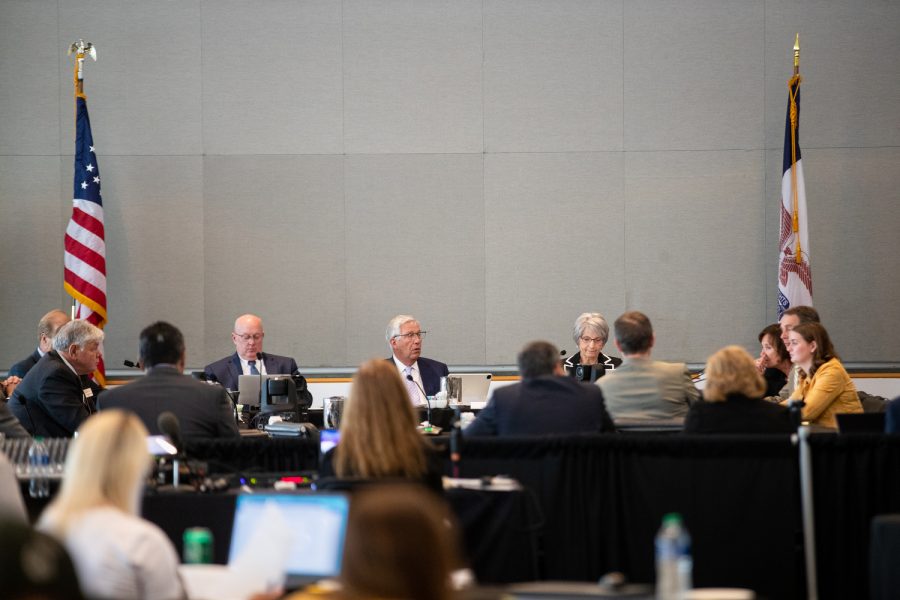A month before COVID-19 hit the U.S., undergraduate students from across the state of Iowa marched into the state Board of Regents’ office in Urbandale, Iowa. Their message was clear: No more tuition hikes. And their message was heard. The regents felt the pressure, and announced a freeze on tuition and fees a few months later.
A little over two years later, as inflation rates topped 9 percent, unionized graduate student workers of the Campaign to Organize Graduate Students (COGS) UE Local 896 marched into a summer regents meeting in Iowa City. We yelled; we chanted; we demanded higher wages. Like clockwork, a few months later, the university voluntarily bumped up our contracted yearly raise from 1.3 percent to 2 percent.
These wins, though small, belie the myth of the regents and Gov. Kim Reynolds as all-powerful and untouchable. They show that students and workers don’t have to suffer in silence. Instead, they make clear that we have power in numbers and that when we organize, we can win.
But to win, we have to understand who is in control. The regents are a nine-member body appointed by the Governor which oversees all of Iowa’s public higher education––the University of Iowa, Iowa State University, the University of Northern Iowa, and the Iowa School for the Deaf. Though Iowa law mandates that the board be balanced by partisan affiliation, Reynolds has easily circumvented this provision by appointing center-right Independents, resulting in a right-wing Board ready to slaughter public higher education to remain in the Governor’s good graces.
The regents are the people deciding to increase tuition and fees, while paying campus workers poverty-level wages. They have depressed TA and RA salaries so severely that almost all graduate TAs and RAs are rent-burdened at the UI. Moreover, graduate workers, like other campus workers, lack access to key benefits like paid parental leave and are forced to pay for parking. The vision the regents have for this university leaves the campus inaccessible to students from middle- and low-income backgrounds and unsafe for trans students and students of color.
Our union, the Campaign to Organize Graduate Students (COGS UE Local 896), has represented graduate student workers since 1996. In that time, graduate workers have organized to win a full tuition waiver, 50 percent reduction in mandatory fees, and a more affordable health care plan. On the ground every day, COGS is organizing workplaces and departments across campus, grieving policy violations, and winning back-pay for overwork.
Campus workers across this university deserve the same and more. When we build public pressure — through rallies, direct actions, and political education campaigns — we force those alternative visions to the surface. Students should not have to suffer and go into debt to get an education.
This year, COGS is demanding a 25 percent emergency base pay increase. This is the raise needed, at minimum, to increase TAs’ and RAs’ base salary to a livable wage in Johnson County for a single adult with no dependents. Additionally, we are calling for paid parental leave and the elimination of mandatory fees.
We also stand in solidarity with other campus workers who also need to be paid a living wage, and with undergraduate students who should not be going into debt to pay their tuition and living expenses. Low wages and high tuition/fees mean a university only accessible to the rich. We reject a university designed to benefit rich investors and right-wing lackeys (like the people who make up the regents). We demand a university for the people. And we can get it by organizing.
If you are a graduate teaching or research assistant, we hope to see you at our general meetings and actions this semester! Follow us at @cogsunion on Twitter, Instagram, and Facebook or visit us at cogs.org for more information.
If you are a campus worker and/or student and want to organize for better living and working conditions, we can help. Email us at [email protected].
– COGS 2023-24 Coordinating Committee
Columns reflect the opinions of the authors and are not necessarily those of the Editorial Board, The Daily Iowan, or other organizations in which the author may be involved.



